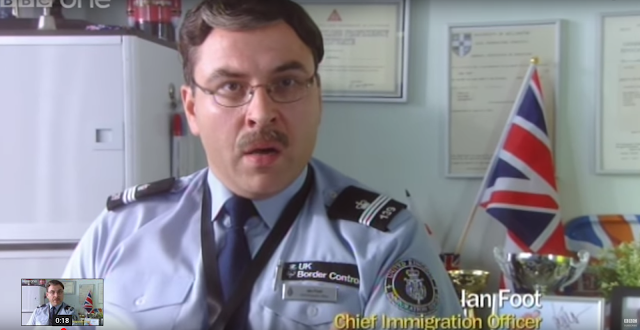Before the title sequence, the an establishing shot displays the location of the mockumentary - this is a convention of the documentary genre and therefore this mockumentary emulates this.
Further establishing shots are used to establish the location and subject matter of life in the airport. Like Cunk on Britain, the introduction uses warm, saturated colours to hint at the comedic nature of the show. This also creates an idyllic atmosphere which adds to the humour when the events that occur within the airport are not idyllic.
As this mockumentary does not aim to be subtle in its mocking of the documentary genre, the titles are exaggerated in terms of the introductions of the characters - the characters all smile into the camera in a very staged fashion. I think this would be good to imitate in our title sequence so that people know from the start that the piece is supposed to be comedic.
The interviews are staged as proper documentary interviews with the subject talking to an 'interviewer' off camera. This is accompanied by an aston introducing the character - as is used in the documentary genre.
This is then followed by 'actuality' shots of the proceedings in the airport e.g. this interview between Ian Foot and Taaj. This is shot like a conversation would be shot in a drama to allow all the comedy to be observed. The colour treatment of these shots is kept very natural looking to emulate the 'actuality' style as documentaries usually keep a very natural look to show that they are displaying reality.
Like documentaries, Come Fly With Me, features sequences of characters e.g. Tommy walking up to the airport before his interview. This helps to introduce the character before they speak to camera. This is also aided by the narrator who is introducing the character as they are seen on screen. The wide angle of this shot helps to establish Tommy in the airport surroundings as well as introducing him as a character.
Actuality is again imitated when Tommy is shown working in his job. This is also filmed in the drama style, using lower angle shots to highlight the comedy within the scene.
Many of the shots within Come Fly With Me play with focus. This shot uses a pull focus to change focus from the check in staff at the back to the check in staff at the front - this emulates the sequences present in the documentary genre as these also often play with pull focus and bringing different things to attention in the shot.
What I have learnt:
- Not all documentaries / mockumentaries have to be fly-on-the-wall in style. This mockumentary consists mainly of interviews and 'actuality' of the characters. This is shot more in a drama style with lower camera angles such as those used in dramas. This works well for this style of mockumentary as a lot of the humour is in the characters' facial expressions and this would not be seen in the typical higher angle fly on the wall documentary style. This means that there is a lot more freedom in terms of how to film the piece, as I am not limited to just using the high angle fly on the wall documentary style. I will experiment with this in the test shoot as I feel using lower angles would work best in our piece as, like Come Fly With Me, a lot of our comedy comes from our characters' facial expressions.
- The programme uses many conventions of the documentary genre to make the programme appear to be serious and factual, however, the interviews and 'actuality' seen within the programme make it comedic and therefore a mockumentary. In order for our mockumentary to be successful, I should attempt to use the conventions of the documentary genre in terms of the lighting and shot types used and leave the comedy to the characters.
- The programme uses bright lighting as this emulates the source material 'Airport'. This adds to the comedy of the mockumentary as visually it can be perceived as a serious documentary, it is just the subject and characters which make the programme comedic.
- The colours are all vibrant and saturated - as explored in my colour theory research, vibrant and saturated colours are often used in comedies to evoke happy joyous emotions in the audience.









No comments:
Post a Comment